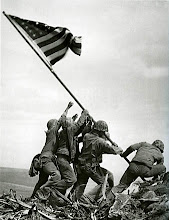Borrowed from the Columbia Conservative Examiner:
Today marks the beginning of confirmation hearings in the U.S. Senate for Supreme Court nominee Sonia Sotomayor.
Most Senate observers say that Sotomayor will have fairly smooth sailing to confirmation and that she may pick up as many as TEN (10) Republican votes in her favor, Remember that, and keep note of their names.
Perhaps never before in the history of U.S. Supreme Court nominations has a nominee been so thoroughly vetted, so thoroughly discredited, and yet so thoroughly hailed as 'the most qualified judge in the nation for the job.'
Obviously these are the same people who would claim that Joe Biden never puts his foot in his mouth.
The following 10 questions will never be asked of Judge Sotomayor. As with everything else Obama has done, the Democrat-controlled Congress heaps lavish praise on the Obama choice, deftly covering up the glaring problems associated with the nominee, merrily prancing along the way, happy to do the Great One's bidding.
However, these questions need to be considered whether the Senate asks them or not.
1. At Yale Law School you adhered to a common school of thought among Yale professors and
graduates that maintains that the ultimate factor that influences judicial decisions is the individual Judge--their heritage, background, unique outlook, and the ultimate power that rests solely with their rulings. How does this point of view square with the view of the Founders who believed that an objective consideration of original intent is the single most important criterion?
2. Another common school of thought among law schools and Constitutional scholars is the notion that the Judge's chief responsibility in deciding a case is to adhere to court precedent. In your ruling effecting the white firefighters in New Haven, you claimed that you were 'only following court precedent.' But what about those instances where court precedent clearly flies in the face of clear original intent with regard to the Constitution? The fact that SCOTUS has overturned your rulings more often than any other federal judge speaks volumes.
3. Do you believe that the U.S. Constitution is the ultimate and final rule of law in the United States?
4. What is your view on the authority, if any, of international courts, or 'international law,' when those laws contradict the principles of the U.S. Constitution? And what about international treaties signed by Presidents that violate Constitutional principles? How can these laws and treaties be considered 'legal' in this country?
5. Do you believe that it is possible for a Supreme Court Judge to act in a manner that is above the law, outside the bounds of our commonly-accepted rule of law? And what is the remedy for such an act, if indeed you believe it is possible?
6. And what, in your opinion, is the remedy for acts that are above the law by the Executive Branch, including programs, policies, and personnel (such as 'Czars')? And please describe how this can be remedied if the other 2 branches of government fail to do their Constitutional duty in providing appropriate oversight and, ultimately, investigation and prosecution?
7. What was the context of your statement when you declared that white men should be castrated? That statement, along with your assertion that a 'Latina woman' would arrive at a wiser decision than a white man appear to be blatantly racist. Do you see how the casual observer could come to that conclusion? And explain exactly how those statements are not racist in nature.
8. You have stated that you are a 'child of affirmative action' due to the fact that you got into Yale although you lacked the scores to do so. In the years since, affirmative action has been largely discredited as an effective means of addressing past discrimination. How can you condemn discrimination based upon race when you admit that you are a beneficiary of such discrimination and indeed support such discrimination through affirmative action?
9. Do you believe that the Second Amendment in the Bill of Rights to the U.S. Constitution affirms the individual citizen's right to own and keep firearms? Do local laws that hamper the ability of citizens to utilize all the tools of effective self-defense violate the concept delineated in the Second Amendment?
10. Do you think that Roe v. Wade is a good decision and that the consequences of this ruling by the Supreme Court have been good for the country?
Perhaps one or two brave Senators may dare ask a couple of these questions, but I doubt the others will ever see the light of day in the Sotomayor hearings. Our nation is much the poorer for it.
Monday
Subscribe to:
Post Comments (Atom)

![[Most Recent Quotes from www.kitco.com]](http://www.kitconet.com/charts/metals/gold/t24_au_en_usoz_2.gif)




























2 comments:
I sent these 10 questions to Senator Jeff Sessions of Alabama, being that is is one of the few Republicans on this committee.
I would suggest in the strongest terms that all of us do the same and demand that the Senators from our local states do not vote for this nominee.
I realize that if Patrick Leahy has his way, this is going to be a shoe-in.
Screw 'em.
Bob
III
oopsy, bad typo:
he is one the the few.......
Bob
III
Post a Comment